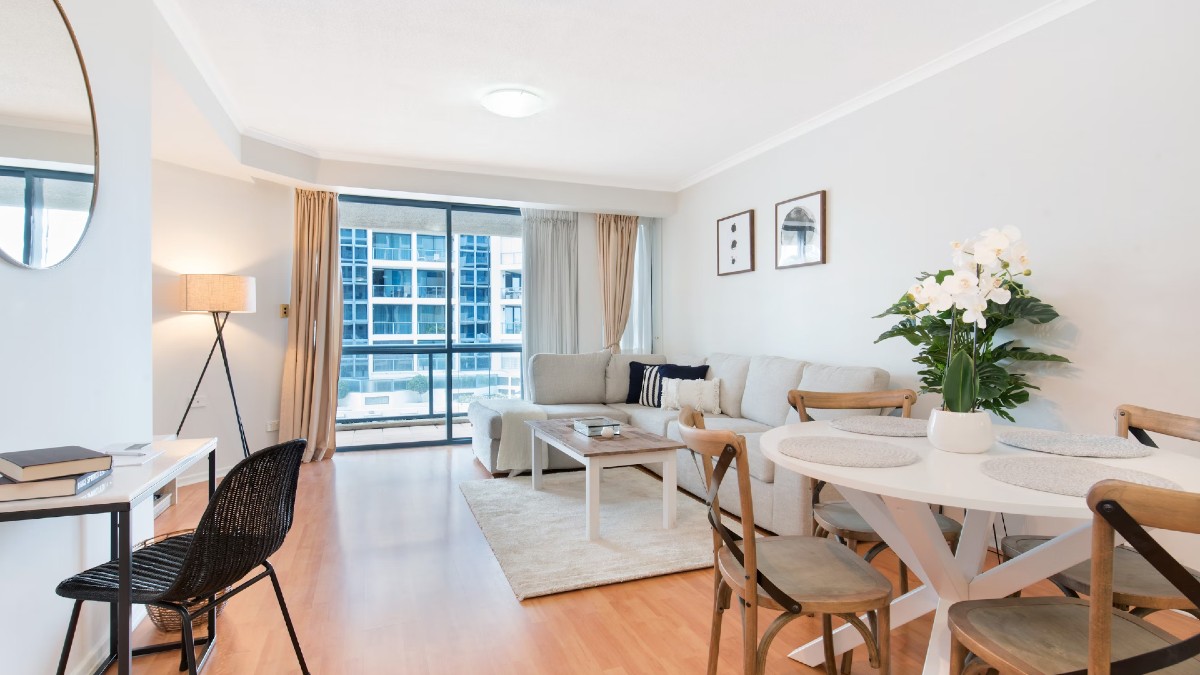Apartment mortgage lending
Lenders aren't typically picky when it comes to the type of building you’re buying – whether it’s a house, townhouse, duplex, or an apartment. You can get a residential home loan for any of these types of properties, as well as for vacant land, investment properties and for the construction of a home (construction loans).
It’s true that standalone houses tend to be more valuable than units and apartments because the land a house sits on could appreciate over time. But a small, new apartment in a good location that’s close to the city could still be considered equally worthy as security for the loan as a big home in the ‘burbs – as long as they have the same resale value.
But there are some unique risk factors that apply to apartments that could affect the lender’s decision to give you a loan.
Buying an apartment or looking to refinance? The table below features home loans with some of the lowest interest rates on the market for owner occupiers.
Lender Home Loan Interest Rate Comparison Rate* Monthly Repayment Repayment type Rate Type Offset Redraw Ongoing Fees Upfront Fees Max LVR Lump Sum Repayment Extra Repayments Split Loan Option Tags Features Link Compare Promoted Product Disclosure
Promoted
Disclosure
Promoted
Disclosure
Promoted
Disclosure
Disclosure
Getting a loan for an apartment: what to consider
1. The size of the apartment
When it comes to securing a loan for an apartment, size matters. Apartments under 40 square meters (excluding balconies and car spaces) often face tougher lending conditions. This is because lenders need to be confident that they can recover the debt if you default on the loan - and the market for smaller apartments tends to be, well, small.
To mitigate this risk, lenders may require a bigger deposit for smaller apartments, particularly studios. These kinds of properties may not qualify for Lenders’ Mortgage Insurance (LMI), which usually helps borrowers with a deposit of less than 20%.
In short, if you're eyeing a compact apartment, be prepared for stricter lending requirements and higher upfront costs.
See more: Guide to lenders' minimum area sizes
2. Postcode restrictions
Lenders’ willingness to provide loans ultimately depends on the level of risk they are exposed to. They aim to limit their concentration risk, meaning that if they perceive lending money for a property purchase as too risky, they may be less likely to approve the loan.
High-density areas, which often rely on high-rise apartments to meet housing demand, can be seen as riskier by lenders due to the potential for lower returns on investment. These areas tend to have less scarcity, which can make properties harder to resell. In the event of an oversupply of apartments, lenders could struggle to offload the property.
In some cities, lenders tend to tread carefully when it comes to high-density apartment developments. Lenders worry about being too heavily exposed to these markets, which can make them less willing to approve loans for properties in these areas. Take Brisbane in 2017, for example — an oversupply of units caused prices to plummet to a three-year low. In response, banks and lenders put restrictions in place, capping loan amounts for properties in certain "high-risk" postcodes at 80% of the property's value.
3. Title of the property
The title of a property – essentially its legal ownership status – is an important factor lenders consider when approving loans. While strata title is the most common ownership type, especially for apartments, there are other options like community or company titles.
Lenders can be more cautious when it comes to these alternative titles. For example, company title properties are owned by a company, and buyers hold shares in that company. These properties are often considered riskier because they can be harder to sell. The company may also have the right of first refusal, which can delay the sale before it even hits the market.
Likewise, properties with a stratum title or tenants in common arrangement can be seen as riskier by lenders due to potential resale delays.
4. Student or serviced apartments
Student and serviced apartments can seem like appealing investment options, especially for first-time investors. With guaranteed rental income and a relatively low deposit requirement (around 20%), these properties may initially look like a good way to get onto the property ladder.
However, securing a mortgage for these types of properties can be more challenging.
Student accommodation, for example, is often harder to sell, especially in a slower market. Serviced apartments tend to be less attractive as security for loans because of the management arrangements that usually require buyers to enter a service agreement with the vendor.
Banks have faced losses in the past due to poorly managed serviced apartments that didn’t deliver the expected returns. These properties are typically leased to a single managing agent who runs the entire building like a hotel, pooling rental income from all owners, which can make it more difficult to sell if things go wrong.
While some lenders may still consider loans for student apartments, many will avoid them due to the higher risks involved, like lower capital growth potential and challenges around selling. University apartments are especially tricky since most lenders won’t accept them as loan security because of the limited rental market. Although there's high demand from students, the fact that these apartments are restricted to student tenants limits their rental appeal.
5. Off-the-plan apartments
Off-the-plan apartments can be trickier when it comes to securing a loan, mainly because of the risk that the property might be worth less than expected by the time it’s completed. In a fluctuating property market, the value of an off-the-plan apartment could drop before construction even finishes.
As a result, some lenders impose stricter limits, with a maximum loan-to-value ratio (LVR) of 80% for these properties.
Since off-the-plan apartments typically take 18 to 24 months to build, lending policies can change quite a bit during that time. What was acceptable to the bank when you first applied might no longer be the case when it’s time to settle. Some lenders may even require a fresh review of your pre-approval before you sign the contract.
It’s important to be cautious when buying off-the-plan. A lot can change in a few years, and property prices, especially in major cities, can change significantly during that period. Brokers have seen situations where buyers locked into off-the-plan purchases found themselves in trouble when the market shifted, potentially risking their deposit if they couldn’t secure the financing they originally expected.
Types of apartments and their impact on financing
When considering buying an apartment, it's important to understand the different types and how they affect financing. Lenders have varying requirements for each type due to perceived risks and market factors:
Studio apartments
-
Description: Studio apartments are compact units featuring a combined living, sleeping, and kitchen space, often under 50 square meters.
-
Financing Considerations: Due to their small size, studios often face stricter lending criteria. Many lenders require a higher deposit (sometimes above 20%) and may impose minimum square footage to qualify for a standard loan. The smaller the unit, the fewer the lenders willing to finance it, particularly if it falls below 40 square meters.
One or two-bedroom apartments
-
Description: These are standard apartment configurations, with one or two separate bedrooms and more defined living areas.
-
Financing Considerations: These apartments are generally easier to finance compared to studios as they meet most lenders' minimum size requirements. They often qualify for standard residential mortgage terms with typical deposits starting from 10-20%, provided the building is not seen as high risk.
High-rise apartments
-
Description: Apartments located in high-rise buildings, often in urban or central business districts.
-
Financing Considerations: High-rise buildings may trigger lender caution due to concerns about market oversupply or structural issues. Lenders might impose higher interest rates, require larger deposits, or limit the loan-to-value ratio (LVR) if the building exceeds a certain number of stories. Specific criteria can apply to buildings over 10 stories, impacting the mortgage terms.
Holiday (serviced) apartments and student apartments
-
Description: These are properties often rented out to short-term or student tenants, sometimes part of managed complexes with strict use restrictions.
-
Financing Considerations: Lenders typically view these properties as riskier due to fluctuating occupancy rates and limited resale markets. Financing can require a deposit of 30% or more, and some lenders might decline outright to finance these properties. Interest rates may also be higher to compensate for the increased perceived risk.
Off-the-plan apartments
-
Description: These are apartments purchased before construction is complete, often based on architectural plans or developer displays.
-
Financing Considerations: Buying off-the-plan involves additional risks, such as potential construction delays, market fluctuations, and changes in property value upon completion. Lenders may offer a construction loan or pre-approval with stricter conditions, and the full loan approval may not occur until the property is near completion. Some lenders require a higher deposit or demand a valuation before finalising the mortgage.
Tips on getting approved for an apartment loan
While it may not be as easy to get a loan approved for a small apartment than it is for a bigger apartment or a house, there are a few things you could do to possibly improve your chances of getting your home loan approved.
1. Have a minimum 20% deposit saved
No matter what type of property you’re buying, the bigger your deposit is, the better your chances are of being approved for a loan. The recommended deposit amount is 20% of the value of the property. This is because if you borrow more than 80% of the value of the property, you’ll often have to pay lenders mortgage insurance (LMI) which protects the lender from the risk of you defaulting on the loan.
The bigger your deposit is, the less of a risk you are in the eyes of the lender. And the bigger the deposit, the less ‘genuine savings‘ you might need, if any at all.
2. Look at apartments larger than 40 square metres
Because apartments any smaller than this are very hard to get finance for, the bigger the apartment is, the better. But if your budget is limited to studio apartments, you may still have options.
There is likely to be a small number of lenders willing to offer loans for studio apartments. A mortgage broker may be able to help match you up with these specialist lenders.
3. Beware of off-the-plan purchases
Off-the-plan apartments always come with an element of risk, which is why borrowers should seriously weigh up all the pros and cons before buying one.
When you’re buying off the plan, as long as you have a 10% deposit, the developer is likely to hand over the contract. They probably won’t look into your finances and see if the amount you’re borrowing is right for your situation, so there's a chance you may run into trouble when you go to get finance and the bank doesn’t approve you for the loan. If that happens, the developer may take your deposit and could even sue you if the apartment sells for less than what you had agreed to pay for it.
4. Do your research
To find the right property and minimise the level of risk you present to potential lenders, it’s important to do your research first. Lenders will take into consideration the location of the property, features of the area, market trends, and the sales performance of similar properties in the area to determine how easy (or difficult) it will be to sell in the future.
If the property you’re purchasing ticks all the right boxes for resale potential, a lender may be more willing to give you a loan.
5. Go guarantor
If you’re a first home buyer and the deposit and loan-to-value ratio (LVR) restrictions imposed by lenders are restricting your ability to qualify for a loan, consider asking your parents to go guarantor.
Having a guarantor involves your parents essentially promising to take responsibility for the loan in the event you default, and perhaps also listing their property as security on the loan. Under such an arrangement, you may even be able to borrow up to 100% of the purchase price. But having a guarantor on a home loan can come with added risks for both you and the guarantor, so ensure you do your research.
Frequently asked questions
1. Is an apartment a good investment?
Investing in apartments can be riskier than investing in a freestanding home, but it all depends on a variety of factors, especially location. Apartments can be easier to rent out than standalone houses, but they often don't rise in value as much as houses.
As a general rule, properties with an element of scarcity and properties that are well-located will generally make a good investment. Consider the services of a buyer's agent for expert personal advice on property investment.
2. How can I get an apartment with no money down?
Like any other property, buying an apartment often requires a considerable down payment. However, if you're a first home buyer, you could technically use the First Home Owners Grant (FHOG) as your full deposit, although such grants are typically restricted to newly-built properties. But on its own, the FHOG is probably not going to be enough to cover the amount required for the deposit. Otherwise, you could consider using a guarantor to secure a home loan if you have no deposit saved.
3. Do apartments increase in value?
The key to choosing an apartment that will deliver strong capital growth is to look at it through the eyes of a future buyer. A decent size, location, aspect, parking, quality construction and an element of scarcity will generally appeal to buyers.
4. Do apartments depreciate?
Like houses, an apartment can also have depreciation costs, which, if you're an investor, you may be able to claim as a tax deduction.
5. Which is better, a house or apartment?
Apartments and houses both come with benefits and drawbacks - neither one is necessarily better than the other. Choosing between an apartment or a house depends on your finances, your lifestyle, and your property goals. In terms of affordability, apartments generally have the upper hand, but houses have higher average rates of value growth.
6. Are apartments safer than houses?
This entirely depends on which apartments and houses you're comparing. Apartments can be much harder for a burglar to break into than houses, particularly if they're on a higher floor and in a building with lots of security. While there's been a spate of structural issues with newly-built apartment buildings around the country recently, houses can be just as prone to building defects - we just don't hear about them in the media as much because a high-rise tower with serious issues will typically grab more headlines than a single house in the suburbs.
Savings.com.au’s two cents
No matter what type of property you’re trying to get a home loan for, lenders are always looking to minimise and avoid risk as much as possible.
With this in mind, lenders prefer to fund the purchase of properties they will be able to sell quickly if you’re unable to pay off the loan. Smaller apartments are generally considered to be harder to sell than bigger ones, because banks believe the buyer pool is much smaller. There are other unique risk factors, which we’ve outlined above, that apply to apartments which may affect a lender’s decision to give you a loan.
While there are some risk factors that may affect your apartment home loan, the same principles apply when it comes to improving your chances of being approved for a house home loan.
Namely: aim to have at least a 20% deposit (if not more) saved, do your research, and try your best to be a low-risk borrower.
Disclaimers
The entire market was not considered in selecting the above products. Rather, a cut-down portion of the market has been considered. Some providers' products may not be available in all states. To be considered, the product and rate must be clearly published on the product provider's web site. Savings.com.au, yourmortgage.com.au, yourinvestmentpropertymag.com.au, and Performance Drive are part of the Savings Media group. In the interests of full disclosure, the Savings Media Group are associated with the Firstmac Group. To read about how Savings Media Group manages potential conflicts of interest, along with how we get paid, please click through onto the web site links.

Ready, Set, Buy!
Learn everything you need to know about buying property – from choosing the right property and home loan, to the purchasing process, tips to save money and more!
With bonus Q&A sheet and Crossword!







 Denise Raward
Denise Raward
 Harry O'Sullivan
Harry O'Sullivan
 Bea Garcia
Bea Garcia
 Aaron Bell
Aaron Bell


